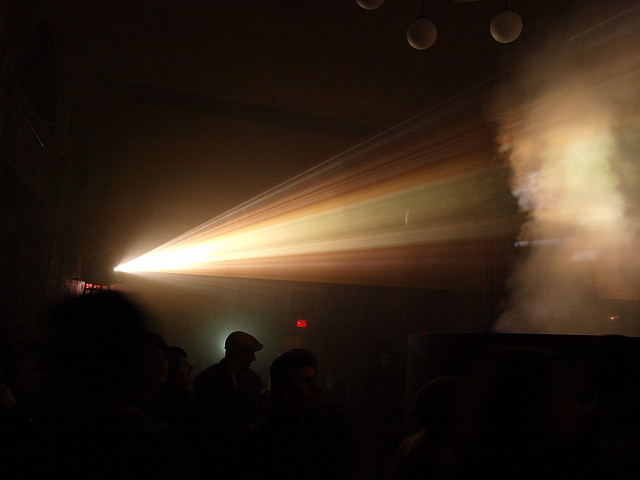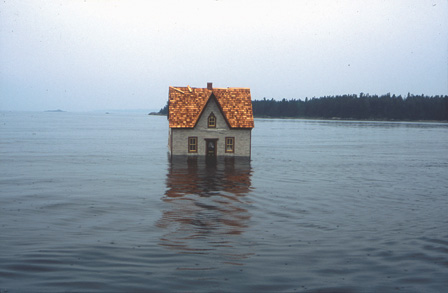Paulette: I was so peripheral to the Funnel.
Mike: Did that make it feel less welcoming?
Paulette: You had to negotiate with Anna Gronau and Michaelle McLean. I remember being told that I couldn’t join because it was a closed shop. You couldn’t sign up, you had to be a member already. I remember that catch-22. Unless you were already part of the club, you couldn’t become a member.
Mike: Why did you want to be a member?
Paulette: I was shooting film at the time and my language was more filmic than video. The Funnel turned me into a video artist, even though I never really felt like I was part of the video community. The video community was all about the politics of censorship. I was more interested in how meaning gets generated, experimental narrative and exploring the boundaries of story telling. What minimal threads could you use to imply stories and engage viewers through conceptual frameworks? It seemed like I was out of sorts with what was happening in the video world. I was really interested in looking at the phenomenology of film and video, how each medium shaped its own reception.
There were so many memorable things I saw at the Funnel, I really felt I was part of that audience. I lived across the street from the Funnel. But in terms of being able to take out equipment, I had no access. In the eighties I bought a Nizo camera and shot rolls of super 8, in the nineties I made work in 16mm. I’ve always been shooting film, but never felt like I was allowed to be part of the Funnel. I was very peripherally involved. What does that say?
Mike: Did you ever meet Ross McLaren?
Paulette: Ross and I taught at the Ontario College of Art and Design. He was funny, a nice guy. He was protected by the women around him. He was off in a little bubble, you never saw him very much. But by then (in the mid-80s) he was starting to go to New York to be with Robin Dickie.
Mike: What do you mean Ross was protected?
Paulette: I don’t know why I said that. There was a mystique around Ross. Anna and Michaelle were the business managers and it appeared as if he was the fragile genius behind it all. It often happens that women do the work of running the show for a man with a few ideas. There was a lot of psychodrama around Ross and his gals.
Mike: Dot described the Funnel as a modernist utopia, a self-enclosed collectivity.
Paulette: That’s pretty astute of her, I wouldn’t have framed it that way.
Mike: Did you feel you were part of a collective project, even as a viewer?
Paulette: Maybe I did. There were some very intense and memorable viewing experiences I wouldn’t have had if not for the Funnel. If it was modernist, it was avant-garde, those terms rub up against each other. How else do you learn about that unique and specific culture if not to immerse yourself at the Funnel? It was hugely influential and educational. “Modernist utopia.” I wouldn’t have chosen those words, but they strike a chord.
Mike: The Funnel moved to Soho Street in 1989 where they lasted just a year, did you ever visit the new theatre?
Paulette: No, but I remember that everything fell apart. Was it because Ross moved to New York? I wasn’t a political insider there. My son was born in 1985 and I started teaching in 1986. I also worked at Trinity Square Video, I was more engaged with what was happening there because that’s where I was employed.
Mike: Did watching avant-garde work help create avant-garde relationships? Did it make different kinds of friendships possible?
Paulette: I was never very actively involved in the construction of my own identity, I seem to be somebody who just followed my nose. Obviously I found myself in a community of people, and I sought that out in a very particular way. A lot of the work I ended up seeing at the Funnel was by the American avant-garde. Is that true? The crazy and interesting work I remember was American, like watching Jack Smith perform. It was such a bizarre experience to see that. I think that Dot and David McIntosh were far more involved. When you’re primarily a maker of things, you’re really obsessed with what you’re making. So the politics, even the people there were secondary because I had my own little community that I was working with. We formed a collective called UMAS (United Media Art Studies) that included Geoffrey Shea, Ed Lam, Christian Morrison, Dimitrijre Martinovic and myself. Christian was an early member of the Funnel. We were peripherally involved with Fastwurms who were very much a part of the Funnel. That was my community. Yes, we formed relationships, but our identity was more aligned with visual art than film. It was the same with Fastwurms, all of us had hybrid creativities and modalities of expression. We weren’t identified by media, but by… I should have a language for this. I’m trying to talk about an armature the work exists around. It’s about immersive installation events. Film was part of that. The Funnel was a modernist utopia, and medium specific, whereas I wasn’t so identified with a particular tradition.
Mike: The Funnel had a gallery and many did performance work.
Paulette: That was hugely influential for me, I was doing performance too. But the gallery was secondary, it never really functioned all that strongly. I don’t have a clear memory of what happened in the gallery or who exhibited there.
Mike: Why weren’t Fastwurms part of the Funnel’s inner sanctum? They showed often, and worked in super 8, the medium cherished above all others.
Paulette: Because they’re not joiners, they’re too independent.
Mike: The people who were there weren’t joiners.
Paulette: That’s not true, it was a clubhouse. There was an inner circle and an outer circle. Kim and Napoleon (of Fastwurms) were their own unit, they operated extremely independently. I think I did as well. A part of that is your own pathology, I think we all have a strangeness around what you belong to and what you don’t belong to. The Funnel was a tight little group of five or six people. Is that a misconception? It was Ross McLaren, Jim Anderson, David Bennell, Michaelle McLean and Anna before she and Ross broke up.
Mike: Ross was the first director, followed by Anna and Michaelle, then David McIntosh. David wasn’t scary to talk to, like the others.
Paulette: They were, weren’t they? Dot and David then became good friends, you’re reminding me how far we all go back.
Mike: You never thought about applying to be the Funnel director?
Paulette: By that time I was getting by on teaching, and I had my son, and was very active in UMAS.
Mike: Could UMAS have existed inside the Funnel?
Paulette: It would have been easier under the rubric of Trinity. I was the president of Trinity Square Video, a for that moment was a strong voice there. And it wasn’t possible to get more involved at the Funnel because of Michaelle and Anna and Ross…
Anna and I worked together at OCAD, she might have gotten Ross’s job, oddly enough. The college didn’t renew his contract because people felt he was in New York too much. I think the students really liked him, and he was a good teacher. But I think he got pushed out, somebody didn’t like the way he had developed his teaching. He was living in New York and coming up to teach. For me it made sense, why not do long intensives and then not be around for a couple of weeks? It’s how production works anyway. I’m not helping you in terms of talking about the Funnel. What history of the Funnel are you telling? Are you writing about modernist utopias?
Mike: That will be part of it, but of course it’s inextricable from the people involved.
Paulette: Are there eras and dynasties?
Mike: Yes.
Paulette: Where are you in it? You always struck me as an insider, as someone who was fundamental to the Funnel’s existence.
Mike: I was never one of the founders who built the theatre, and that was a great divide. Then in 1981 there was a second massive renovation when Censor Board opposition led to city officials demanding fire proofing. I wasn’t part of that either.
Paulette: Of course, I so remember that. The Censor Board obsessed us all. I didn’t actually participate in the renovation, but I was very aware of the politics of what was going on.
Mike: Many in the video community felt the Funnel was a collaborator because of their ongoing dealings with the provincial Censor Board.
Paulette: I thought that was stupid, and it comes from a very narrow part of the video community. I always sympathized with the Funnel’s compliance. The problem I’ve always had with the video community is that they have an all or nothing attitude, there’s just one way to do it and we know what the way is.
When we were getting our work into TIFF (Toronto International Film Festival), the video community – and we’re really only talking about one or two people – wanted artist fees. Artists weren’t allowed to participate in TIFF because they didn’t pay fees. Today it’s called Wavelengths but there used to be a video program at the festival that was quashed because they didn’t pay fees. Festivals are not galleries, they are different worlds.
Censorship and artist fees were two areas where the video community was strident about how others could act. The Funnel was attacked for being compliant with the Censor Board but I thought it was another interesting act of subversion, having to submit forms for these crazy movies that the Board was obviously not interested in looking at. Struggles with the Censor Board were debilitating for the Funnel.


